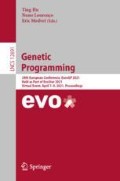Abstract
The promotion and maintenance of the population diversity in a Genetic Programming (GP) algorithm was proved to be an important part of the evolutionary process. Such diversity maintenance improves the exploration capabilities of the GP algorithm, which as a consequence improves the quality of the found solutions by avoiding local optima. This paper aims to further investigate and prove the efficacy of a GP heuristic proposed in a previous work: the Inclusive Genetic Programming (IGP). Such heuristic can be classified as a niching technique, which performs the evolutionary operations like crossover, mutation and selection by considering the individuals belonging to different niches in order to maintain and exploit a certain degree of diversity in the population, instead of evolving the niches separately to find different local optima. A comparison between a standard formulation of GP and the IGP is carried out on nine different benchmarks coming from synthetic and real world data. The obtained results highlight how the greater diversity in the population, measured in terms of entropy, leads to better results on both training and test data, showing that an improvement on the generalization capabilities is also achieved.
Access this chapter
Tax calculation will be finalised at checkout
Purchases are for personal use only
References
Alfaro-Cid, E., Merelo, J.J., Fernández de Vega, F., Esparcia-Alcázar, A.I., Sharman, K.: Bloat control operators and diversity in genetic programming: a comparative study. Evol. Comput. 18(2), 305–332 (2010). https://doi.org/10.1162/evco.2010.18.2.18206
Aslam, M.W., Zhu, Z., Nandi, A.K.: Diverse partner selection with brood recombination in genetic programming. Appl. Soft Comput. J. 67, 558–566 (2018). https://doi.org/10.1016/j.asoc.2018.03.035
Beyer, H.G., Schwefel, H.P.: Evolution strategies - a comprehensive introduction. Natl. Comput. 1(1), 3–52 (2002). https://doi.org/10.1023/A:1015059928466
Burke, E., Gustafson, S., Kendall, G., Krasnogor, N.: Advanced population diversity measures in genetic programming. In: Guervós, J.J.M., Adamidis, P., Beyer, H.G., Schwefel, H.P., Fernández-Villacañas, J.L. (eds.) Parallel Problem Solving from Nature – PPSN VII, pp. 341–350. Springer, Berlin Heidelberg, Berlin, Heidelberg (2002)
Crepinsek, M., Liu, S.H., Mernik, M.: Exploration and exploitation in evolutionary algorithms: a survey. ACM Comput. Surv. 45(3), 1–33 (2013). https://doi.org/10.1145/2480741.2480752
Day, P., Nandi, A.K.: Binary string fitness characterization and comparative partner selection in genetic programming. IEEE Trans. Evol. Comput. 12(6), 724–735 (2008). https://doi.org/10.1109/TEVC.2008.917201
De Jong, E.D., Watson, R.A., Pollack, J.B.: Reducing bloat and promoting diversity using multi-objective methods. In: Proceedings of the Genetic and Evolutionary Computation Conference GECCO2001, vol. GECCO-2001, pp. 11–18 (2001)
Fernandez De Vega, F., et al.: Time and individual duration in genetic programming. IEEE Access 8, 38692–38713 (2020). https://doi.org/10.1109/ACCESS.2020.2975753
Fortin, F.A., De Rainville, F.M., Gardner, M.A., Parizeau, M., Gagńe, C.: DEAP: evolutionary algorithms made easy. J. Mach. Learn. Res. 13, 2171–2175 (2012)
Grosman, B., Lewin, D.R.: Lyapunov-based stability analysis automated by genetic programming. In: 2006 IEEE Conference on Computer Aided Control System Design, 2006 IEEE International Conference on Control Applications, 2006 IEEE International Symposium on Intelligent Control, pp. 766–771 (2009). https://doi.org/10.1109/CACSD-CCA-ISIC.2006.4776742
Khayyam, H., Jamali, A., Assimi, H., Jazar, R.N.: Genetic programming approaches in design and optimization of mechanical engineering applications. In: Jazar, R.N., Dai, L. (eds.) Nonlinear Approaches in Engineering Applications, pp. 367–402. Springer, Cham (2020). https://doi.org/10.1007/978-3-030-18963-1_9
Koza, J.R.: Genetic programming as a means for programming computers by natural selection. Stat. Comput. 4(2), 87–112 (1994). https://doi.org/10.1007/BF00175355. https://link.springer.com/content/pdf/10.1007%2FBF00175355.pdf
Luke, S., Panait, L.: Fighting bloat with nonparametric parsimony pressure. In: Guervós, J.J.M., Adamidis, P., Beyer, H.G., Schwefel, H.P., Fernández-Villacañas, J.L. (eds.) Parallel Problem Solving from Nature – PPSN VII, pp. 411–421. Springer, Berlin Heidelberg, Berlin, Heidelberg (2002)
Mahfoud, S.W.: Niching methods for genetic algorithms. Ph.D. thesis (1995)
Marchetti, F., Minisci, E.: A hybrid neural network-genetic programming intelligent control approach. In: Filipič, B., Minisci, E., Vasile, M. (eds.) BIOMA 2020. LNCS, vol. 12438, pp. 240–254. Springer, Cham (2020). https://doi.org/10.1007/978-3-030-63710-1_19
Oh, C.K., Barlow, G.J.: Autonomous controller design for unmanned aerial vehicles using multi-objective genetic programming. In: Proceedings of the 2004 Congress on Evolutionary Computation (IEEE Cat. No.04TH8753), vol. 2, pp. 1538–1545 (2004). https://doi.org/10.1109/CEC.2004.1331079
Rosca, J.P.: Entropy-driven adaptive representation. In: Proceedings of the Workshop on Genetic Programming: From Theory to Real-World Applications, pp. 23–32 (1995)
Schmidt, M., Lipson, H.: Symbolic regression of implicit equations. In: Riolo, R., O’Reilly, U.M., McConaghy, T. (eds.) Genetic Programming Theory and Practice VII, pp. 73–85. Springer, US, Boston, MA (2010). https://doi.org/10.1007/978-1-4419-1626-6_5
Shir, O.M.: Niching in evolutionary algorithms. In: Rozenberg, G., Bäck, T., Kok, J.N. (eds.) Handbook of Natural Computing, pp. 1035–1069. Springer, Berlin Heidelberg (2012). https://doi.org/10.1007/978-3-540-92910-9_32
Squillero, G., Tonda, A.: Divergence of character and premature convergence: a survey of methodologies for promoting diversity in evolutionary optimization. Inf. Sci. 329, 782–799 (2016). https://doi.org/10.1016/j.ins.2015.09.056
Verdier, C.F., Mazo Jr., M.: Formal controller synthesis via genetic programming. IFAC-PapersOnLine 50(1), 7205–7210 (2017). https://doi.org/10.1016/j.ifacol.2017.08.1362
Žegklitz, J., Pošík, P.: Benchmarking state-of-the-art symbolic regression algorithms. Genet. Programm. Evolvable Mach. (2020). https://doi.org/10.1007/s10710-020-09387-0
Author information
Authors and Affiliations
Corresponding author
Editor information
Editors and Affiliations
Rights and permissions
Copyright information
© 2021 Springer Nature Switzerland AG
About this paper
Cite this paper
Marchetti, F., Minisci, E. (2021). Inclusive Genetic Programming. In: Hu, T., Lourenço, N., Medvet, E. (eds) Genetic Programming. EuroGP 2021. Lecture Notes in Computer Science(), vol 12691. Springer, Cham. https://doi.org/10.1007/978-3-030-72812-0_4
Download citation
DOI: https://doi.org/10.1007/978-3-030-72812-0_4
Published:
Publisher Name: Springer, Cham
Print ISBN: 978-3-030-72811-3
Online ISBN: 978-3-030-72812-0
eBook Packages: Computer ScienceComputer Science (R0)

